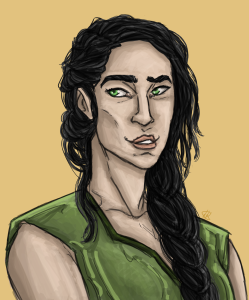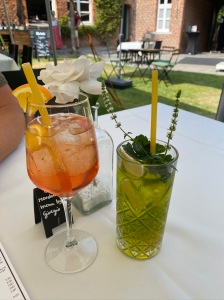Quite a while back I wrote a rather lengthy post about the Mesmer series, and what it has meant for me these past few years. Which is quite a lot. Should you ever be interested to find out, you can find the article here:
https://filosofieke.wordpress.com/2019/04/29/the-mesmer-series-two-years-of-writing/
People don’t ask you: what does writing mean to you? (If they do, they are, in all probability, writers!)
They ask: “So what’s your story about?”
Running gag on Twitter has it that we, the authors, spontaneously forget the zillion hours we have spent living in this universe and we start stumbling out some generalities before we change the topic.
Guilty as charged:
“A historical fantasy series set in Ancient Gaul. It has a healer school (Mesmer), and soldiers. And a Gaul. Oh and some romance, too. Yeah, it is indeed a lot of work, but I love it. So … anyway … how’s your cat, Jeanine? Coughed up any hair balls lately?”

It’s enough for a (virtual) coffee break conversation, but rather dull. Doesn’t quite cover why my characters have tricked me into learning fiddle. Which I don’t have time for, by the way. They are a stubborn, persistent band of idiots and I am selling them short.
So what’s is it about then, truly? This series I have been working my ass off on for more than three years now?
I have this big fancy quite well-formed Roman soldier fastened against my writing wall, and some people believe I’m writing a Spartacus-like tale.
Not quite. Sexy series, sure, but quite a gruesome setting too, with lots of casual rape scenes which…yeah, let’s just not have those, shall we?
Anyway, lots of stories have been set in the rough time frame of the Gallic wars, and a connection with magic and Celtic druids is far from unique too. Many a book in my native language, many a book worldwide. Setting of Asterix, Mary Sutcliffe’s novels, Lindsey Davis’s novels.
Many, many war focused stories too, which I haven’t read because I have zero interest in war-focused stories. There is no glory in conquest (obviously I am not a Roman Emperor!). Mesmer has no interest in it either. I remember a story I read as a kid (in Dutch, no translation) about a teenage Gaul being sold into slavery. How he eventually became important to his Roman masters, which allowed him to go search for his sister, who, by the way, had been raped (this is mentioned, not shown, but it’s like a main staple for the genre). And the story had a romance, but it was not a very fun romance because the girl was just a plot point that needed rescuing. But hey, she existed! The Asterix series managed to almost not have female characters until the nineties (I’m stern for the things I love most).

Being a woman I find the existence of female characters rather interesting.
Phyllis became my girl of choice, equipped with the ability to make someone slit their own throat with the flick of a wrist, which is a handy feat to have, if not a bit morbid. Luckily for her environment, at the start of the Mesmer series, she is younger than when I first started writing her, and she hasn’t quite tested out all her options yet.
The Mesmer series became the story about the friendship between a thirteen year old girl and a seventeen year old boy, and that’s in my opinion, its very core. Marcus’s and Phyllis’s friendship isn’t an evident one, and while the story is set well over 2000 years ago, many of the trouble they encounter mirrors the trouble they would have had, had they met today.
Some of that trouble is external. Marcus is a soldier and while Mesmer collaborates with his Centuria, the school has strict non-violence laws. Contact between both is limited to the missions that the Centuria offers protection for. Marcus has his own rules of conduct when it comes to Mesmer, and he fully intends to stick to them. Phyllis and her parents travel from Rome to Gaul with Marcus’s Centuria, but they are set for very different paths that don’t allow for much crossover.
Forbidden romance stage set? Check. (Sofie getting banned from Twitter for an indecent age gap? Also check!)
The age gap remains. Writing friendships with age gaps became a bit of a thing, I suppose. They exist, after all. Despite Marcus’s insistence that they shouldn’t. That’s where the internal trouble comes into play. Much of Marcus’s and Phyllis’s friendship is based on my own experiences as a female friend with male friends (this exists too, Twitter).
I have had the extreme privilege of finding some of my best friends in what would eventually become my family-in-law. I started dating my husband at sixteen, and him being the oldest of his band of siblings and cousins meant we spent time jumping bouncy castles together, going to amusements parks, together, trying out our first beers (well theirs, but they caught up), playing in the yard and sitting at the kiddie table.

I met one of my best friends when I was sixteen and he was only twelve. Like Marcus it took me years before I even classified us as friends. One day, I think in my first year of university, we travelled to a manga comic shop together, just the two of us, karaoke singing Disney songs on the bus and I think that’s when I figured it out. Perhaps it happened a little before, when we staffed a summer sangria bar together at a tennis club.
My first drafts of the Mesmer series don’t include Marcus’s and Phyllis’s friendship because I had not lived it yet. But their relentless bickering and tentative bond are one of my favourite parts to write. They would have made for an atrocious love match, but as friends they shine. I have been jealous of them this, year, because they got to hug and meet and laugh together while that became so difficult for many of us.
Mesmer is about a pair of friends trying to find their place in the world, while they meet each other’s friends, teachers, superiors, love interests, enemies, family. Sometimes several of those at once. There is magic, some of it quite dark, there are sword fights and there is history.
But at the end of the day I could have set it in 2020 (apart from, of course, 2020 being 2020).
I would just have had less mighty forests, a lot more cars and smartphones and less horseback travels. I would be less at ease basing Pimpernella’s appearance on a girl at work, because she might wear headphones wherever she goes as well and people would start to notice resemblances between themselves and my characters. After which I would have to move, which isn’t practical, since I live close to work.
(if you are one of my colleagues reading this, she switched jobs by now, otherwise I would most certainly not have picked this example. Which parts of you have made it into my fiction will forever remain a mystery!)
Historical fantasy is a setting for me more than it is my genre. Smart? Marketable? Not sure. But it is what kept me writing and that is always a good start.



